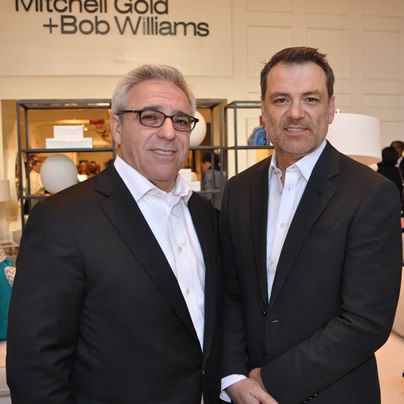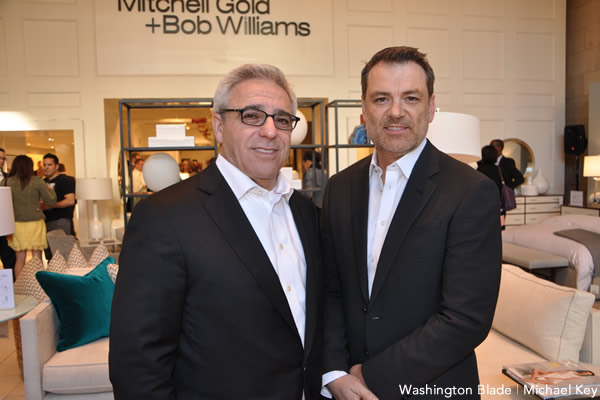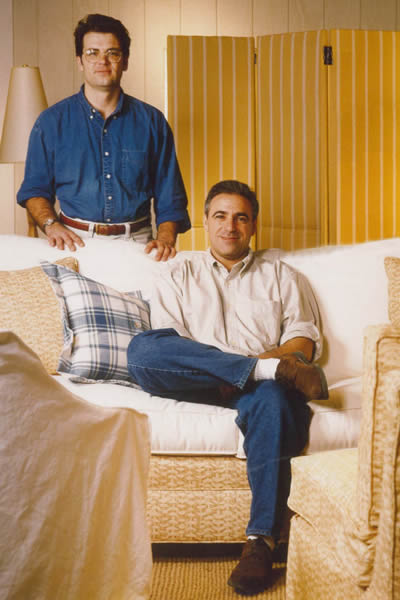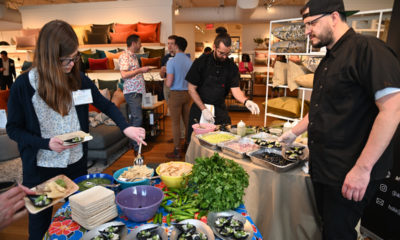Arts & Entertainment
Celebrating silver in style
Gay-owned furniture company Mitchell Gold + Bob Williams marks milestone


Mitchell Gold (left) and business partner Bob Williams at their Washington store for an event in 2013. (Washington Blade file photo by
Mitchell Gold + Bob Williams
25th anniversary event
A benefit for Sitar Arts Center
Wednesday
6-9 p.m.
Mitchell Gold + Bob Williams Washington location
1526 14th St., N.W.
mgbwhome.com
RSVP requested
202-332-3433
Mitchell Gold and Bob Williams, co-owners of the eponymous furniture company, didn’t originally intend for their company to be as big as it is today.
Gold says they were originally thinking of a modest business model in which they’d work four days a week, have a small stable of customers and do about $5 million a year in sales.
“We didn’t have to make that much money,” Gold says. “It was just the two of us living down South, it’s much less expensive to live here, and we thought we would just have this nice little company. … But as Bob often tells people, ‘It’s not that Mitchell lied — it’s just that he can’t count.’”
Started in 1989 with about $60,000, things took off rather quickly. They sold about 800 dining tables and 5,000 chairs before they started making any of the pieces. Gold, who’d been fired from the furniture company he’d worked for, had connections with major retailers like J.C. Penney, Crate & Barrel and others, which he visited armed with sketches and fabrics Williams had made. They were profitable the first year they were in business.
“We had fabrics that were different and unusual for the time,” Gold says. “So we were able to show retailers, ‘This is how this will look in your store.’ And they bought it right away. People have said I’m not a bad salesman, so I was able to close the sales and get the production going quickly.”
The two, who’d been together as domestic partners about two years before, had moved to Hickory, N.C., from New York and were interested in going into business together.
“We just thought we could do it better than traditional manufacturers,” Gold says. “We thought we could make a better commitment to customers, ship it more quickly and with Bob’s sense of style, you know, I certainly felt we could offer people a more stylish look for a better price.”
Williams worked for a small ad agency and gradually cut back his time there as he spent more and more with the company, then known as the Mitchell Gold Company (it was changed to its present name in 2002).
Now they’re celebrating 25 years and have more than 700 employees, a stable of celebrity clients, 17 stores and plans to open four more by year’s end and a 600,000-square-foot factory and home base in Taylorsville, N.C.
Several spoke at a company event two weeks ago where 11 of their original 21 employees who are still with the company were recognized. It appears, from a transcript of comments, that morale there is strong.
Ken Hipp, the company’s senior vice president of retail stores and merchandising, has been with them for seven years and calls Gold and Williams “wonderful mentors.”
“It’s been quite a ride,” says Hipp, who’s also gay. “I can’t imagine my career or my life without them.”
Known for a style they call “quintessentially American,” their products are designed to be stylish, yet comfortable. Interior designer Brian Patrick Flynn of TBS’s “Movie & a Makeover” show has called their products “custom-looking pieces at medium-to-high price-points” and says it’s a “genius brand” he and his clients “can’t get enough of.”
On Wednesday, the two will be in town for an event at their D.C. store at 1526 14th St., N.W., an anniversary event that will benefit the Sitar Arts Center. It’s one of a series of events they’re having at their various locations throughout the year.
In a country where just 25 percent of new employer firms are still in business 15 years or more after starting according to the Small Business Administration, theirs is a nearly unfettered success story.
It hasn’t all been easy going, though. Williams remembers many long hours in the early years, though he also says those were some of the most “exhilarating times of my life.”
They recall years of working what felt like round-the-clock schedules and didn’t take a vacation until two years into it, but were gratified by strong out-of-the-gate sales.
“Customers liked what we were doing immediately,” Williams says. “We never had to go call on people. The more they heard about us, the more we had people wanting to buy from us.”
They broke up on the personal side about 12 years into the business, though they’re wholly comfortable working together and are each married and have been with other men for years — Gold has been with Tim Gold for seven years; Williams has been with Stephen Heavner for 11 years.
Might their relationship have lasted if it weren’t for the company? It’s a thorny question they don’t wish to dwell on.
“We don’t give much thought to it,” Williams says.
“It takes a lot of time and energy to go back and visit the past,” Gold says. “We’re more focused on the future.”
They acknowledge there were “a few little awkward moments, but not too much,” as Gold says. Keeping the company strong was chief among their priorities as always, they say.
The only time they had any significant downsizing was in 2008. Gold says it was a hard, but at the time necessary, decision in the face of a huge recession.
The company prides itself on the health care package it offers, on-site day care and cafeteria and unabashed LGBT advocacy work.
They say providing such amenities pays off in the long run.
“I think what we have proven is that you can be profitable and do the right thing,” he says. “When you have people who aren’t sick, they’re being more productive and that makes things more profitable. With our day care, if little junior has a problem, somebody goes and takes care of it and is back in 15 or 20 minutes, not the three hours it would take to go across town.”
They guess about 15 percent of their employees are also LGBT and estimate between 15-20 percent of their clientele is as well. Gold says it’s “certainly higher than other furniture retailers.”
Gold, who wrote a book called “Crisis: 40 Stories Revealing the Personal, Social and Religious Pain and Trauma of Growing up Gay in America” in 2008, says being open about such things is a central component to the company.
He relishes telling of a celebration dinner they had with loan officers after paying back a $25 million loan they’d used to expand. Several of the bank execs told him how reading “Crisis” had given them new compassion for LGBT issues, from one man who stepped up his giving at a homeless shelter to another whose wife came out.
“One by one, they went around the table and told us how much our advocacy work had meant to them,” Gold says.
Coming from a staid banking environment, Hipp says finding a place he could be out on the job was a revelation.
“I thought I loved banking but I realized banking did not love me,” he says. “I was very uncomfortable and very conflicted over my future and I was met with some very harsh realities. I could not believe that someone of my age, I was in my early 20s at the time, could actually go to work someplace where it was OK for me to be who I was. I didn’t have to tuck any part of myself under my sleeve. I could actually say that I was gay and it didn’t matter. … I was just a kid from the south and I thought that was the best it would get.”
Some of the 25th anniversary events will benefit LGBT and AIDS causes. Gold next plans an open letter to the Pope urging him to change Vatican teaching that homosexuality is sinful behavior.
“When you get down to it, that’s really the seminal reason why people think gay people should not have equality,” Gold says. “The whole issue of sin is really the crux of why people are against it.”
But has there been backlash or lost sales along the way?
“Our business just keeps going at such a pace that’s ahead of the industry with sales and growth and things like that,” he says. “You know, we can’t worry about the one or two people who aren’t going to buy from us because we’re gay and outspoken.”
Mitchell Gold and Bob Williams on:

Bob Williams (left) and Mitchell Gold in the early years of their business. (Photo courtesy of Mitchell Gold + Bob Williams)
• Their all-time favorite products:
GOLD: Leather club chairs they designed after spotting vintage pieces at a Paris flea market.
“If something sells that well and looks pretty, I sure do like it,” he says.
WILLIAMS: “Our slipcovers are great because they’re just so versatile — you can dress them up or down, change the style and they just give off this great ambience of relaxed, casual comfort.”
• How practical the whites and neutrals they use so often are for everyday
GOLD: “Today’s fabrics are a lot different from what you saw 20-30 years ago. They’re much friendlier to live with and stain resistant.” And if you spill red wine? “In a lot of the fabrics, yes, it will come out. But you have to get it quickly, not let it sit there a day.”
• Nate Berkus
GOLD: “We love Nate Berkus.”
WILLIAMS: “He has great hair.”
GOLD: “Yes, he has great hair, he’s cute and adorable and we’re fairly friendly with him. I like his work a lot.”
WILLIAMS: “His last book was great.”
• Thom Filicia (of “Queer Eye” fame)
GOLD: “Sweet guy and talented. We were at a design kind of home in South Hampton and his room was really a standout.”
• 2013 sales?
GOLD: “Over $100 million.”
• Lulu, the company mascot
GOLD: “She’s resting in peace. She was 12 and a half and she will be the mascot in perpetuity. The thing about bulldogs is once they decide on something, that’s it. They figure out a way to get it. She came to work with us everyday and loved walking around and saying hi to everyone.”
Sports
Bisexual former umpire sues Major League Baseball for sexual harassment
Brandon Cooper claims female colleague sexually harassed him

A fired former umpire is suing Major League Baseball, claiming he was sexually harassed by a female umpire and discriminated against because of his gender and his sexual orientation.
Brandon Cooper worked in the minor league Arizona Complex League last year, and according to the lawsuit he filed Wednesday in federal court in Manhattan, he identifies as bisexual.
“I wanted my umpiring and ability to speak for itself and not to be labeled as ‘Brandon Cooper the bisexual umpire,’” he told Outsports. “I didn’t want to be labeled as something. It has been a passion of mine to simply make it to the Major Leagues.”
But that didn’t happen. Instead of being promoted, he was fired. His suit names MLB and an affiliated entity, PDL Blue, Inc., and alleges he had endured a hostile work environment and wrongful termination and/or retaliation because of gender and sexual orientation under New York State and New York City law.
“Historically the MLB has had a homogenous roster of umpires working in both the minor and major leagues,” Cooper claims in his suit. “Specifically, to date there has never been a woman who has worked in a (regular) season game played in the majors, and most umpires are still Caucasian men. To try to fix its gender and racial diversity issue, defendants have implemented an illegal diversity quota requiring that women be promoted regardless of merit.”
Cooper claims former umpire Ed Rapuano, now an umpire evaluator, and Darren Spagnardi, an umpire development supervisor, told him in January 2023 that MLB had a hiring quota, requiring that at least two women be among 10 new hires.
According to the suit, Cooper was assigned to spring training last year and was notified by the senior manager of umpire administration, Dusty Dellinger, that even though he received a high rating in June from former big league umpire Jim Reynolds, now an umpire supervisor, that women and minority candidates had to be hired first.
Cooper claims that upon learning Cooper was bisexual, fellow umpire Gina Quartararo insulted him and fellow umpire Kevin Bruno by using homophobic slurs and crude remarks. At that time, Quartararo and Cooper worked on the same umpiring crew and being evaluated for possible promotion to the big leagues.
This season, Quartararo is working as an umpire in the Florida State League, one of nine women who are working as minor league umpires.
Cooper said he notified Dellinger, but instead of taking action against Quartararo, he said MLB ordered Cooper to undergo sensitivity training. According to his lawsuit, he was also accused of violating the minor league anti-discrimination and harassment policy.
Cooper’s suit says he met with MLB Senior Vice President of Diversity, Equity and Inclusion Billy Bean — who the Los Angeles Blade reported in December is battling cancer.
The lawsuit says at that meeting, Bean told the umpire that Quartararo claimed she was the victim, as the only female umpire in the ACL. Cooper said he told Bean Quartararo regularly used homophobic slurs and at one point physically shoved him. He also claims that he has video evidence, texts and emails to prove his claim.
But he said his complaints to Major League Baseball officials were ignored. His lawsuit said MLB passed him over for the playoffs and fired him in October. He said of the 26 umpires hired with Cooper, he was the only one let go.
Through a spokesperson, MLB declined to comment on pending litigation. Quartararo has also not publicly commented on the lawsuit.
a&e features
Eastern Shore chef named James Beard Finalist
Harley Peet creates inventive food in an inclusive space

In a small Eastern Shore town filled with boutiques, galleries, and the occasional cry of waterfowl from the Chesapeake, Chef Harley Peet is most at home. In his Viennese-inflected, Maryland-sourced fine-dining destination Bas Rouge, Peet draws from his Northern Michigan upbringing, Culinary Institute of America education, and identity as a gay man, for inspiration.
And recently, Peet was named a James Beard Finalist for Best Chef: Mid-Atlantic – the first “Best Chef: Mid-Atlantic” finalist representing the Eastern Shore.
Peet, after graduation from the Culinary Institute of America, took a position as sous chef at Tilghman Island Inn, not far from Bas Rouge. Falling in love with the Eastern Shore, he continued his passion for racing sailboats, boating, gardening, and fishing, and living his somewhat pastoral life as he opened Bas Rouge in 2016 as head chef, a restaurant part of the Bluepoint Hospitality group, which runs more than a dozen concepts in and around Easton, Md.
Coming from a rural area and being gay, Peet knew he had his work cut out for him. He was always aware that the service and hospitality industry “can be down and dirty and rough.”
Now as a leader in the kitchen, he aims to “set a good example, and treat people how I want to be treated. I also want to make sure if you’re at our establishment, I’m the first to stand up and say something.”
The Bas Rouge cuisine, he says, is Contemporary European. “I’m inspired by old-world techniques of countries like Austria, Germany, and France, but I love putting a new spin on classic dishes and finding innovative ways to incorporate the bounty of local Chesapeake ingredients.”
His proudest dish: the humble-yet-elevated Wiener Schnitzel. “It is authentic to what one would expect to find in Vienna, down to the Lingonberries.” From his in-house bakery, Peet dries and grinds the housemade Kaiser-Semmel bread to use as the breadcrumbs.
Peet works to support the LGBTQ community inside and outside of the kitchen. “I love that our Bluepoint Hospitality team has created welcoming spaces where our patrons feel comfortable dining at each of our establishments. Our staff have a genuine respect for one another and work together free of judgment.”
Representing Bluepoint, Peet has participated in events like Chefs for Equality with the Human Rights Campaign, advocating for LGBTQ rights.
At Bas Rouge, Peet brings together his passion for inclusion steeped in a sustainability ethic. He sees environmental stewardship as a way of life. Peet and his husband have lived and worked on their own organic farm for several years. Through research in Europe, he learned about international marine sourcing. Witnessing the impacts of overfishing, Peet considers his own role in promoting eco-friendly practices at Bas Rouge. To that end, he ensures responsible sourcing commitments through his purveyors, relationships that have helped create significant change in how people dine in Easton.
“I have built great relationships in the community and there’s nothing better than one of our long-standing purveyors stopping in with a cooler of fresh fish from the Chesapeake Bay. This goes especially for catching and plating the invasive blue catfish species, which helps control the species’ threat to the local ecosystem.
Through his kitchen exploits, Peet expressed a unique connection to another gay icon in a rural fine-dining restaurant: Patrick O’Connell, of three Michelin starred Inn at Little Washington. In fact, Peet’s husband helped design some of O’Connell’s kitchen spaces. They’ve both been able to navigate treacherous restaurant-industry waters, and have come out triumphant and celebrated. Of O’Connell, Peet says that he “sees [his restaurants] as canvas, all artistry, he sees this as every night is a show.” But at the same time, his “judgment-free space makes him a role model.”
Being in Easton itself is not without challenges. Sourcing is a challenge, having to either fly or ship in ingredients, whereas urban restaurants have the benefit of trucking, he says. The small town “is romantic and charming,” but logistics are difficult – one of the reasons that Peet ensures his team is diverse, building in different viewpoints, and also “making things a hell of a lot more fun.”
Reflecting on challenges and finding (and creating) space on the Eastern Shore, Peet confirmed how important it was to surround himself with people who set a good example, and “if you don’t like the way something is going … move on.”

Team DC, the umbrella organization for LGBTQ-friendly sports teams and leagues in the D.C. area, held its annual Night of Champions Awards Gala on Saturday, April 20 at the Hilton National Mall. The organization gave out scholarships to area LGBTQ student athletes as well as awards to the Different Drummers, Kelly Laczko of Duplex Diner, Stacy Smith of the Edmund Burke School, Bryan Frank of Triout, JC Adams of DCG Basketball and the DC Gay Flag Football League.
(Washington Blade photos by Michael Key)



















-

 State Department3 days ago
State Department3 days agoState Department releases annual human rights report
-

 Maryland4 days ago
Maryland4 days agoJoe Vogel campaign holds ‘Big Gay Canvass Kickoff’
-

 Politics3 days ago
Politics3 days agoSmithsonian staff concerned about future of LGBTQ programming amid GOP scrutiny
-

 The White House2 days ago
The White House2 days agoWhite House debuts action plan targeting pollutants in drinking water












